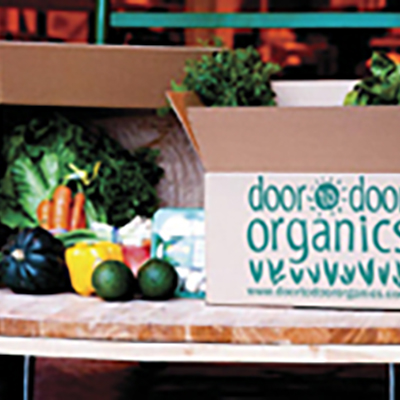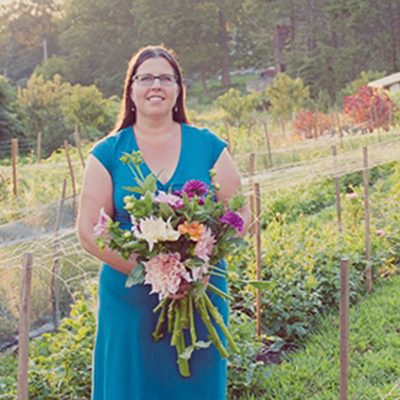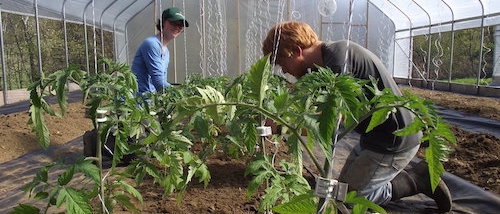Practical advice on what’s working to replace lost business
Interview by Andrew Mefferd
I knew Love ‘n Fresh Flowers for their long-standing farmer/florist work, so I was excited to hear from owner Jennie Love about what has been working for her business through the current COVID disruptions. Since most of her business comes from weddings, it has taken several different strategies to sell the stream of flowers that were supposed to be for nuptials. She’s also the President of the Association of Specialty Cut Flower Growers (ASCFG).
“Love ‘n Fresh Flowers is an urban farm. We’re within the city limits of Philadelphia, Pennsylvania. I started the farm twelve years ago, and we’re currently farming about five acres,” said Love.
“It is a Certified Naturally Grown flower farm. Up until this point, about 90% of my business has come through weddings and other special events and workshops. And then, a very small percentage of my business was coming through a long-standing CSA and small grocery store accounts.”
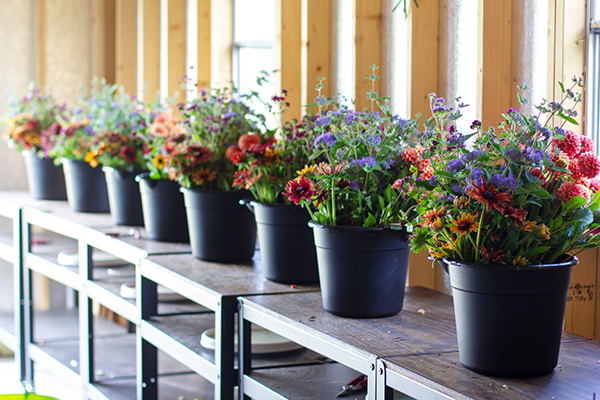
“Up until April of this year, I had never done on-farm pick-ups of any kind. It’s a shadowy gray area with city zoning so I never wanted to deal with it. And I also had never done retail sales, aside from the CSA, which does not pick up at the farm.”
“This has all been quick learning on my feet. I was fortunate to have a well-established online shop for workshop registrations in the past. So, it was relatively quick and easy to shift sales through there once I had some new marketing strategies in place.”
“Given that 90% of your business was weddings and events, is the drop off as precipitous as we would expect?” I asked.
“Yes, the drop off is gargantuan at this point. Philadelphia went into lockdown, I believe on March 13. And as soon as that went out, we started getting phone calls and emails from clients. We would have had our first wedding the third weekend of March. And then we had weddings steadily through the rest of the year. And all of our weddings for March, April, May, and June and now July, most of them have rescheduled. Two of them are outright canceled, three are still wobbling,” said Love.
“So yeah, it’s been pretty bad. And then it seems very, very likely that Philadelphia will follow suit with many other large cities around the world. Large gatherings are not going to be allowed for quite a long time, even if we can ‘go back to business.’”
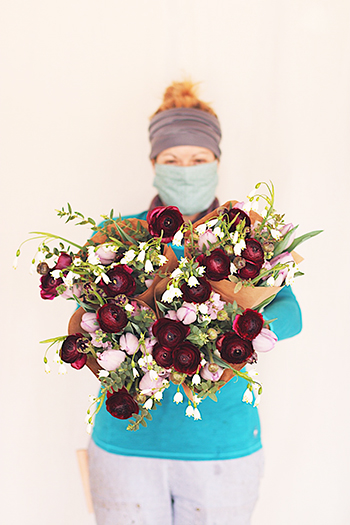
“So, I’m assuming that I will have no weddings this year. That just helps me manage my emotional roller coaster better. One of the challenges I’m experiencing currently, is that we still have all these contracts for weddings.”
“Our fall is now jam-packed starting in August. And so, because I’m still locked into contracts for these weddings, I still have to continue with my old business model while trying to also begin a whole new business model. So that’s been a ball of yarn that I didn’t realize I was playing with until I was totally snagged in it.”
“The number of different ways you’ve diversified is really amazing. Can you tell us about that and how it’s working out for you business-wise?” I asked.
“The workload is just really different. With weddings, the business I was used to doing was extremely high stress, because the stakes were so high. And so, I was managing a very long term, very financially invested contractual relationship. So that came with its own ball of worms and it was very challenging in a very different way.”
“What I’m doing now, I need lots of labor, but the stakes are lower. So, if I can figure out the labor and the logistics and the right price point, we can make it. That’s the other thing I’ve really had to figure out. I didn’t have time to do lots of market research. I’ve had to figure out the right price point to get people who are willing to buy the flowers, and the right marketing strategy.”
“It’s been about 40 days now, I feel like I’ve spent the past 40 days with my brain on nonstop, and not talking to anybody. And just thinking and planning and trying to understand how to do deliveries and all of that. I feel exhausted by the logistics of it, but it’s not necessarily more stressful or more work per se, than the business I had before,” said Love.
“It’s not necessarily more work, but it’s probably a lot less profit. And that’s what I’m ultimately worried about for my farm. We’re totally fine. We’re doing great sales right now, but are they at the profit margin I need to make this farm keep working? That’s really up in the air at the moment.”
“I think it’s really important right now, no matter what you’re selling, people need to realize this isn’t a stopgap measure. If you had talked to me three weeks ago, I would have assumed what I was dreaming up was a stopgap measure. But now I think this is the way we’re going to be doing business for a year at least, maybe the way we do business forever.”
“Because if I can dream this up and figure it out and do it right, maybe this is an even better business model for me, I don’t know. But I think instead of just having these hurried, knee jerk reactions to the marketplace, it’s a really good time for farmers to remember this could be the long game, and we need to be prepared for that too,” said Love.
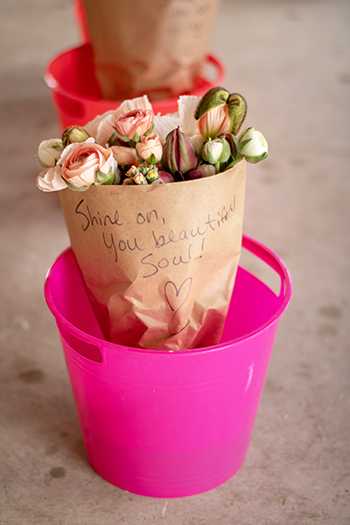
Flower Club
Flower Club was Love’s immediate response to Covid-19 that launched for sale on March 13th, when Philadelphia was going into lockdown. It sold out within 24 hours. It was an organized system just for the month of April for customers to come pick up flowers from the farm.
“Flower club was a knee jerk reaction when I realized all of my April weddings were gone. We’re zone seven here, so normally it’s still pretty cold. April isn’t a super productive month for us, but we do have tulips and we have ranunculus and anemones and Iceland poppies and the typical cast of characters. I knew I was going to be sitting on several thousand tulips that normally would have been used for weddings.”
“And I had called up my grocery store account, and at the time they didn’t say no to me yet, but they did eventually say no. I knew I had to think of something fast.”
“Then I came up with the Flower Club idea. People prepay for five bouquets because there were five Thursdays in April. So, every Thursday afternoon, people came and got a bouquet from the farm. Five Thursdays, they prepay for five bouquets. And it was a flat fee of $175.”
“That’s been awesome. We sold out so fast. The energy around the farm, having people come once a week, seeing the reaction that people have to the flowers has really fed my soul and helped me keep going.”
“The price point is also pretty good. But it was only for the month of April. The reason I’m not continuing flower club is because there are only so many people I can have come to the farm and do it safely, so that was the limiting factor. We only allowed 20 people here through the course of the afternoon.”
“They have to sign up for a time slot to come to the farm. And that’s done via a Google Doc link that they have, so that was the limiting factor. I couldn’t do any more than what I was already doing with that model. So I moved on from it, but it was a great model, generally speaking, and has been very successful.”.
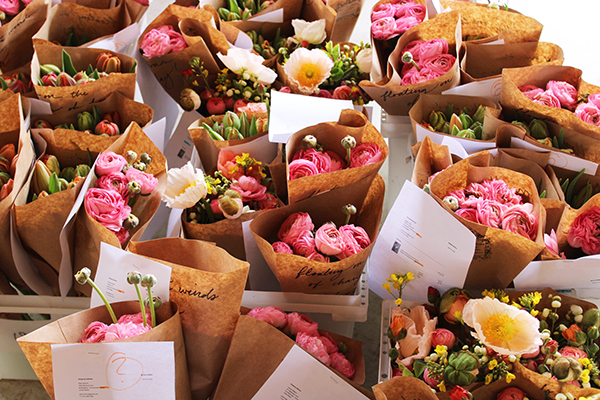
The Season Pass
“The Season Pass is a new program for on-farm pick-ups that I’m rolling out for sale at the end of April to help meet demand for Mother’s Day. Customers would purchase a pass and be able to pick up five bouquets and three bunches in total throughout the season this year. Pick-ups will be during a very specific window each week and all sales will be prepaid through the purchase of the pass,” said Love.
“The season pass is also for on-farm pickup. Because it’s not every single week that people have to come, they’re going to be able to come anytime from mid-May to mid-September. I can therefore sell more season passes. Because they get five bouquets and three bunches of flowers, the most they would come to the farm the whole season would be eight times.”
“If people can come a maximum of eight times through the season, I can open up 20 time slots through the course of one day. I could accommodate about 75 people, which is a higher number than I could with just a month-to-month club. And I tried to increase the price point a little bit more too because now I’m more concerned about profit margins.”
“It will be contactless. The flowers are just going to be set up inside the barn. I will not be interacting with people, nor will my crew. We are going to be out in the fields, working when they come pick up. And everybody is just going to have their name on their bouquet or bunch sleeve. And everything’s prepaid.”
“It also gives me some flexibility with the availability every week. So that was the one thing I was worried about: say our August weddings do go through. And so, maybe I can only provide 10 bouquets a given week because we have a huge wedding in August.”
“Because I’m not promising a specific number from week to week. I can just put ten time slots on the Google Doc, and then once that’s full, nobody else can come, but they’ll still have the opportunity to get their bouquets other weeks.”
“The price point that I worked out was $43 per bouquet, and then the bunches, they are $10 each. I priced the Season Pass at $249 because I didn’t want to go above $250. I wanted anybody who signed up for the season pass to have to pay a fair amount of money not in an unfair way, but I didn’t want to just take small sales for that.”
Flower CSA
“I’ve had a flower CSA since 2010. Usually it was just a small 30-40 member program that I used to funnel off our surplus harvest from weddings. Since COVID-19, we’ve nearly tripled our CSA. Our CSA pick up sites are hosted by other places in the city, so this lets us get more flowers out further afield without overloading our own on-farm capacity.”
“So, the CSA is thriving. It was one of the first things people started to buy rapidly as soon as they decided they needed to help support our farm. And I’m so grateful that I’ve had a standing CSA, because having it really helped me understand how to move quickly in this process.”
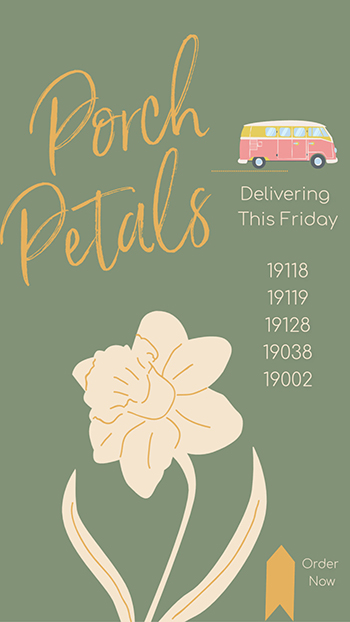
Porch Petals
“Porch Petals is a contactless delivery program I launched just before Easter as a result of my long-standing grocery account telling me they couldn’t take any flowers. They didn’t think shoppers had money for flowers anymore, and they wanted more floor space in their store to let shoppers spread out. We have done three delivery runs so far in the past two weeks and they have all sold out within eight hours of orders being open.”
“I cap orders at 60 so we can do the entire delivery route in no more than seven hours. Delivery is limited to zip codes very close to the farm OR a cluster of zip codes that may be further away from the farm. But all deliveries themselves are within five miles of each other, so delivery driving is minimized.”
“Porch Petals is going phenomenally well. We are selling every stem that we’ve got, every single time. The limiting factor has been the volume. I only have so many flowers right now. I think if we wanted to expand, as more flowers come on, we could have a huge business in this delivery service. But the logistical nightmare of it is kind of crazy.”
“I’m fortunate that I live in the city, so zip codes are very condensed. But I still think this concept could be applied no matter where anybody lives just because it helps you be more efficient. We’re able to do about ten deliveries an hour, which is really good.”
“I sell all our stuff through the platform bigcartel.com. And I open up the order window on Mondays, then it usually sells out within a few hours, and delivery is on Fridays. So that gives me from Monday to Friday to get organized and keep things efficient. I think that’s one piece of the puzzle that has made it doable.”
“Then in bigcartel itself, and I’m pretty sure other online shops, you can automatically print out the packing slips for every order. Then my crew and I make the bunches and bouquets and we staple the packing slip to each bouquet or bunch on the paper sleeves. And then the bouquets and bunches get sorted into buckets that have the zip code written on them.”
“They’re big white Procona buckets. When they get loaded for my driver, she knows exactly which zip code to focus on. She can sort the Excel file by zip codes. And then she imports up to 26 addresses at a time with the same zip code into MapQuest. And then MapQuest plans her shortest route for her. Deliveries are super quick because she’s mapping them that way.”
“And then when she’s delivering, she rips off the packing slips at the point of delivery, and she’s double checking to make sure people are getting what they ordered. We’ve had no unhappy customers yet, every single one has gone really smoothly.”
“And then she lets me know when she’s done with a zip code. And what I can do is go into bigcartel and send automated emails and let them know their flowers have been delivered.”
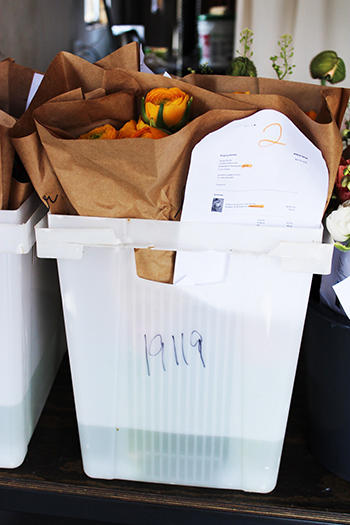
Selling hope
“I think there’s a lot of hope and vibrancy for flowers. And this could apply to all farming. From what I’ve witnessed personally, if we can learn as an industry, how to continue to meet the needs of all these people who suddenly realize how incredibly fortifying flowers can be for their emotional well-being; if we can find good ways to serve those people, and we can find the proper way to do it that also serves ourselves and keeps us profitable, I think there’s a really good chance that the floral industry, albeit completely and utterly changed, will be thriving by the end of all this. Because I’ve never seen such a deep appreciation for flowers before.”
“People’s eyes are open, certainly in a way they have never been open before. And I’m pretty sure the same is going to go for food and vegetables.”
“So I think it’s on us as farmers to understand that people are valuing us in a different way than they ever have. But now it’s our job to step up, and be convenient, and be smart, and serve well. So that when it does come time to start going back to the grocery store, or to call FTD, people will still think, ‘This is great. I’m so happy to have this relationship with my farmer.’”
“If we can do it right, I think it actually could be really good. We’re going to get there. So I think I’m selling hope at this point. And I started a new hashtag, a harvest of hope (#aharvestofhope), just because I felt like that was the best summary of what I’ve been doing. If we can better understand what we’re actually selling, then we can all, both customer and farm, can work together to create a better future for all of us.”
Andrew Mefferd is the Editor of Growing for Market. He farms in Maine.

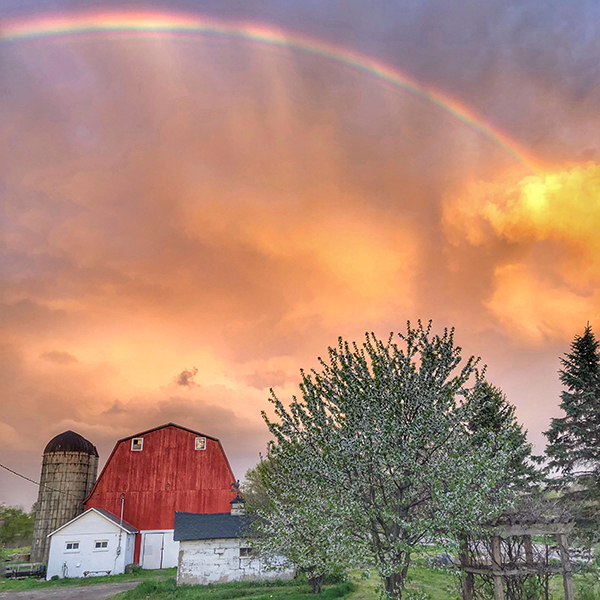 Settle in, the changes aren't just for the short term
Settle in, the changes aren't just for the short term
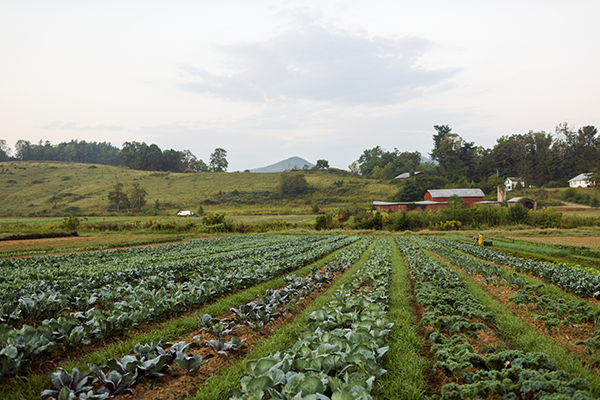 It’s not too late for online/preorder seedling sales, farmers market custom bags, and We Give a Share
It’s not too late for online/preorder seedling sales, farmers market custom bags, and We Give a Share
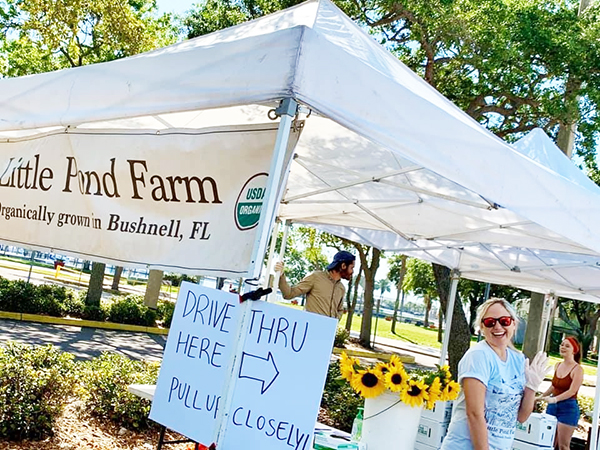 It became clear in March that the COVID-19 outbreak would disrupt almost every facet of life. So, we reached out to growers, asking for constructive ways they were keeping business going as safely as possible during the pandemic to share with you.
It became clear in March that the COVID-19 outbreak would disrupt almost every facet of life. So, we reached out to growers, asking for constructive ways they were keeping business going as safely as possible during the pandemic to share with you.